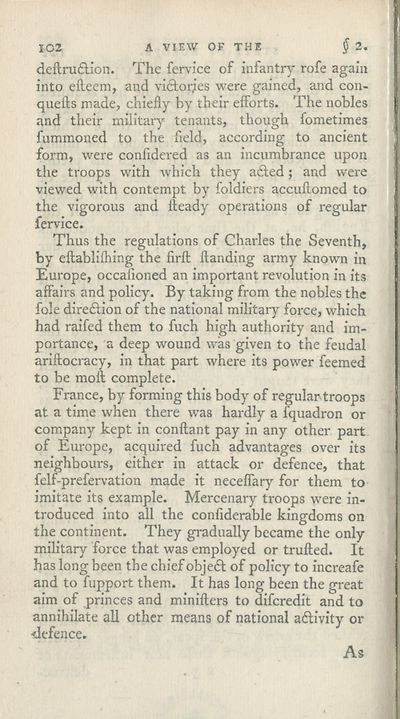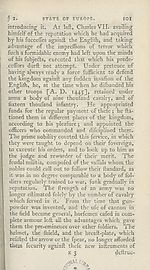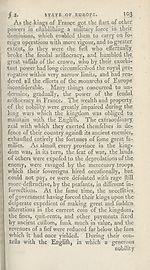Download files
Complete book:
Individual page:
Thumbnail gallery: Grid view | List view

A VIEW OF THE
102 A VIEW OF THE § 2.
dcftruftion. The fervJce of infantry rofe again
into efteem, and victories were gained, and con-
quefts made, chiefly by their efforts. The nobles
and their military tenants, though fometimes
fummoned to the field, according to ancient
form, were confidered as an incumbrance upon
the troops with which they acted; and were
viewed with contempt by foldiers accuflomed to
the vigorous and fleady operations of regular
fervice.
Thus the regulations of Charles the Seventh,
by eftablifhing the firfl: {landing army known in
Europe, occafioned an important revolution in its
affairs and policy. By taking from the nobles the
foie direction of the national military force, which
had railed them to fuch high authority and im¬
portance, a deep wound was given to the feudal
ariftocracy, in that part where its power feemed
to be moft complete.
France, by forming this body of regular troops
at a time when there was hardly a fquadron or
company kept in conflant pay in any other part
of Europe, acquired fuch advantages over its
neighbours, either in attack or defence, that
felf-prefervation made it neceffary for them to
imitate its example. Mercenary troops were in¬
troduced into all the confiderable kingdoms on
the continent. They gradually became the only
military force that was employed or trufled. It
has long been the chief object of policy to increafe
and to fupport them. It has long been the great
aim of princes and miniflers to difcredit and to
annihilate all other means of national aftivity or
defence.
As
102 A VIEW OF THE § 2.
dcftruftion. The fervJce of infantry rofe again
into efteem, and victories were gained, and con-
quefts made, chiefly by their efforts. The nobles
and their military tenants, though fometimes
fummoned to the field, according to ancient
form, were confidered as an incumbrance upon
the troops with which they acted; and were
viewed with contempt by foldiers accuflomed to
the vigorous and fleady operations of regular
fervice.
Thus the regulations of Charles the Seventh,
by eftablifhing the firfl: {landing army known in
Europe, occafioned an important revolution in its
affairs and policy. By taking from the nobles the
foie direction of the national military force, which
had railed them to fuch high authority and im¬
portance, a deep wound was given to the feudal
ariftocracy, in that part where its power feemed
to be moft complete.
France, by forming this body of regular troops
at a time when there was hardly a fquadron or
company kept in conflant pay in any other part
of Europe, acquired fuch advantages over its
neighbours, either in attack or defence, that
felf-prefervation made it neceffary for them to
imitate its example. Mercenary troops were in¬
troduced into all the confiderable kingdoms on
the continent. They gradually became the only
military force that was employed or trufled. It
has long been the chief object of policy to increafe
and to fupport them. It has long been the great
aim of princes and miniflers to difcredit and to
annihilate all other means of national aftivity or
defence.
As
Set display mode to:
![]() Universal Viewer |
Universal Viewer | ![]() Mirador |
Large image | Transcription
Mirador |
Large image | Transcription
| Antiquarian books of Scotland > Kings & rulers > History of the reign of the Emperor Charles V. > Volume 1 > (120) |
|---|
| Permanent URL | https://digital.nls.uk/109183771 |
|---|
| Description | By William Robertson. London : Cadell and Davies, 1798. |
|---|---|
| Shelfmark | ABS.1.76.13 |
| Additional NLS resources: | |
| Description | Thousands of printed books from the Antiquarian Books of Scotland collection which dates from 1641 to the 1980s. The collection consists of 14,800 books which were published in Scotland or have a Scottish connection, e.g. through the author, printer or owner. Subjects covered include sport, education, diseases, adventure, occupations, Jacobites, politics and religion. Among the 29 languages represented are English, Gaelic, Italian, French, Russian and Swedish. |
|---|

